HANOI – 1992
(Not a “Peaceful Easy Feeling'”)
Transportation by motorcycles, bikes, and cyclos, Hanoi 1992 (Photo by Marc Yablonka)
By Marc Yablonka
I can still feel every pothole jerking my aching back in the rocky road that led from the Gia Lam Airport, where I was picked up by a group of professors, and taken to my hotel room on the outskirts of Hanoi in 1992. And how can I forget a hotel with the name “Army Guest House”? One of two hotels where visiting journalists, academics, NGOs, and the like were housed in Hanoi in those days.
Once they had deposited me in my room on the “3th” floor (I knew it was the “3th” because that’s what the sign right outside my door told me it was!), I set about exploring Hanoi, once the seat of a government against whom all my Vietnam veteran friends back home in California had fought. To borrow very loosely from the lyrics of one of my favorite Eagles’ songs, it was not a very “Peaceful Easy Feelin’” to be in North Vietnam even though the war had been over for 17 years.
The Hanoi whose streets I walked was not the Hanoi that I’m told exists today. To say it was impoverished would be an understatement. Nothing like the still thriving city of Saigon (referred to as Ho Chi Minh City then as now except for by Saigonese) I had visited and reported from only two years before.
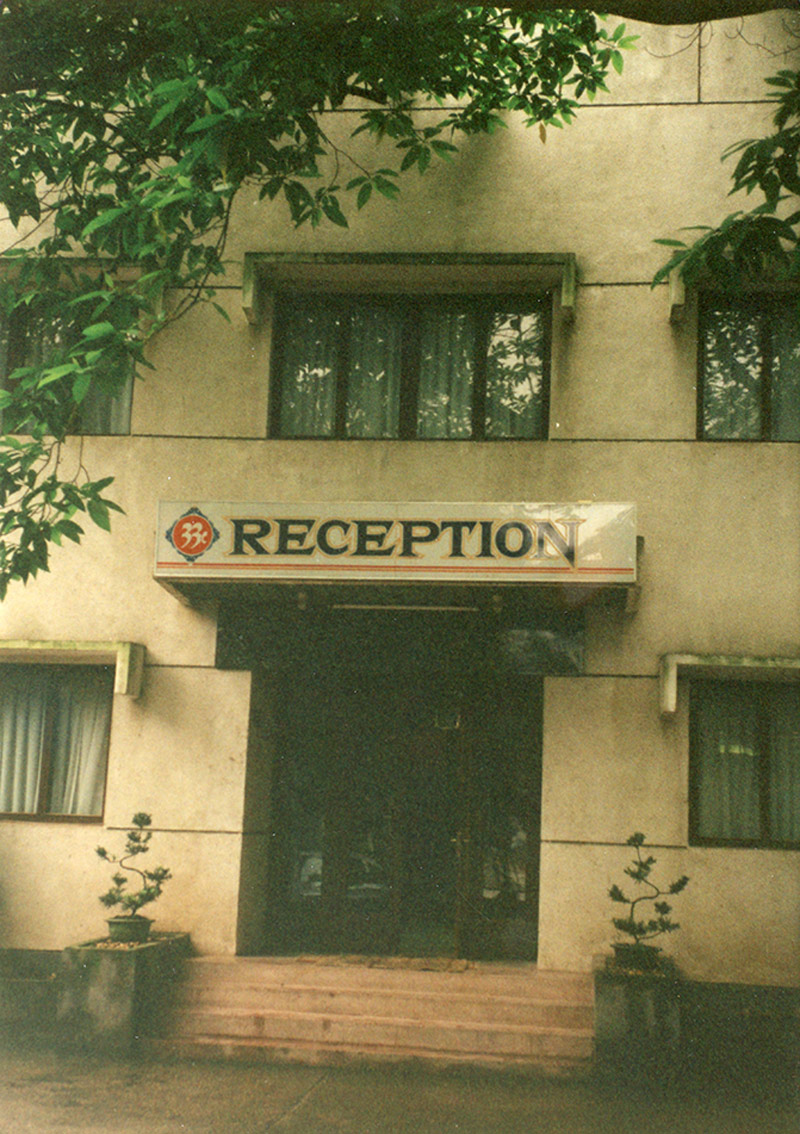
Army Guest House, Hanoi, 1992 (Photo by Marc Yablonka)
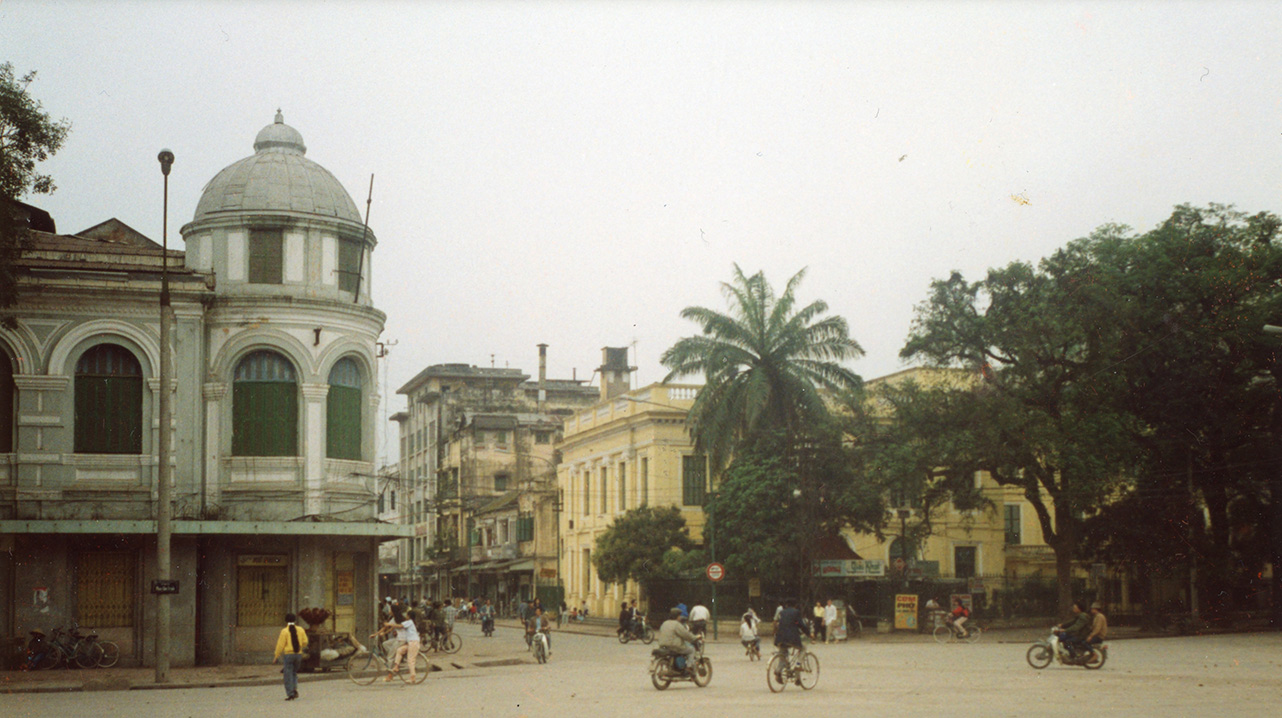
Downtown Hanoi 1992 (Photo by Marc Yablonka)
English professors I would meet the next day at the Hanoi University for Teachers of Foreign Languages, where I’d come to lecture on American English through a program at the University of Wisconsin, confided in me when in private that their salaries amounted to the equivalent of a meager US$12 a month.
When I arrived at the university the next morning, for the first day of what would be a three week stay still vivid in my memory, I was shown the library. A library with books that appeared undusted since NVA tanks crashed through the gates of the Presidential Palace in downtown Saigon on April 30th, 1975. A day revered by northerners and despised by South Vietnamese Việt Kiều (Overseas Vietnamese).
When asked if there was a book I’d like to see, to be polite, I asked for a book about General Vo Nguyen Giap, mastermind of the battles at Dien Bien Phu against the French and the 1968 Tet Offensive, against us. A dusty copy of his biography was produced, but my two years of Vietnamese language studies at UCLA were too rudimentary for me to even attempt to read it. I thanked the professor who handed it to me, apologized for my inability, and handed it back to him.
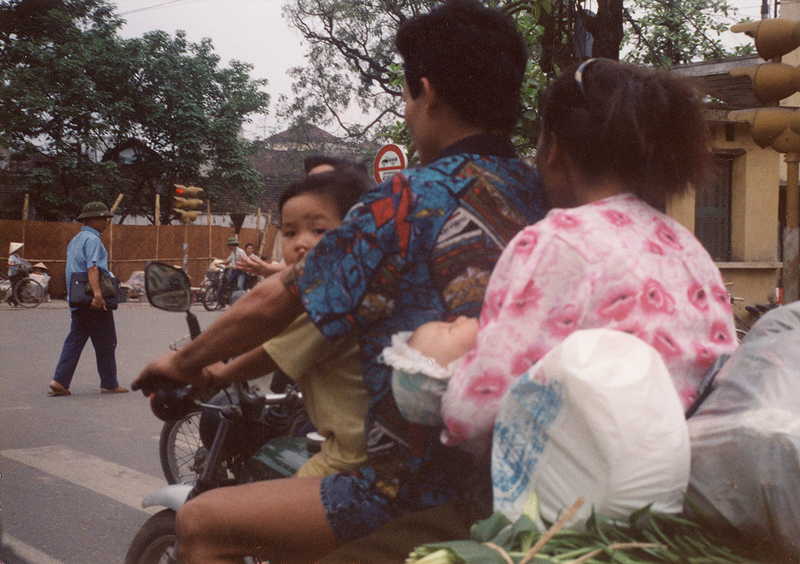
A family on a motorcycle, Hanoi (Photo by Marc Yablonka)
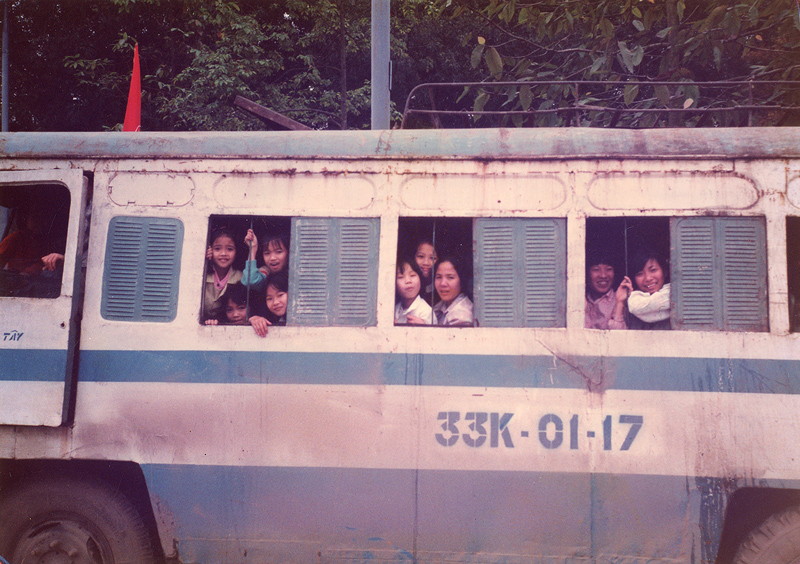
Kids on a school bus, Hanoi, 1992 (Photo by Marc Yablonka)
From there, I was taken on a tour of the rest of the university. A university that reminded me of photos I’d seen of bombed out Berlin after World War II. There was no glass in the windows — probably by design, either because of Vietnam’s heat, or the previous threat of American bombs — and the paint was crawling up the walls. This was to be the place of my voluntary employ for the next three weeks.
My “lectures” if you could call them that, were punctuated by meetings with my fellow English professors. One meeting in particular is indelible in my mind some 31 years later.
Tea began the meeting, as is the case in all Asian countries. The topic of the meeting, for which I was put on the spot, was how to influence Vietnamese students’ writing so that, instead of writing around the point, they learn to write directly to the point, like the professors had heard of American college students. To this day, I cannot remember if I was of any help to them at that meeting.
Another difference I noticed immediately between American college students and their Vietnamese counterparts was the diminutive size of the Vietnamese female students. I wasn’t “checking them out,” but how could I not notice the physiques of 20-year-old students whose bodies resembled that of 12-year-old American girls?
There were other things I will never forget about that meeting.
First and foremost was its Overlord. A big, fat, insulting Russian bear of a woman, who eyed me with the most suspicious eyes my own eyes had ever met the gaze of. Insulting, not to me, but to the very Vietnamese that her country had sent her to spy on. When breaktime occurred and my new professor friends were speaking in their native tongue, all she could say was, “Oh you Vietnamese with your six-tones! You make me sick!” And all that my new colleagues could do was lower their eyes in silence. God damn that bitch! She made me so mad. I would have loved to put her in her place.
Of course, that would have guaranteed me a one-way ticket out of Vietnam. Much like had happened to another American professor the year before I’d arrived just because she used the Bangkok Post in one of her English lessons right in front of her minder.
The Russian bear, done with her insults, the English department meeting resumed. No sooner had it restarted, than the beautiful professor to my left, adorned in her typical Vietnamese áo dài, the alluring, traditional Vietnamese outfit worn by Vietnamese females young and old alike, wrote an English name on a piece of paper and slid it over to me.
She leaned close and whispered, “Do you know her?” “No,” I responded equally in a whisper. “Should I?” “She was my friend during the war. She was going to be an actress.” “What city is she from?” I asked. “I can look her up and contact her for you when I get home!” “I don’t know,” she said.
My heart felt so deeply for her when I saw a tear come to her eye and she withdrew from our closeness. What’s more, I never saw her again the entire time I was at the university. Was she somehow punished by the Russian bear for her show of emotion and proximity to me? Fired from her job? Disappeared? I will never know. But I think of her often and wish her peace.
Night after night, I would return to my room at the Army Guest House. Mornings were always a pleasure since I was always awakened by a lovely hotel employee, always decked out in her white áo dài. Her name was Quy. She always awakened me in the fluent French she spoke with “Bonjour monsieur Marc!”
One evening, when I’d returned from a dinner with a group of Canadian NGO workers, I entered the lobby only to find Quy talking with her husband, a sociologist, I later learned, who’d come to pick her up from work on his Simson scooter.
The next morning, as I walked through the lobby enroute to the awaiting beat up Russian Volga auto driven by Mr. Anh, who would cart me off to the university, Quy stopped me and asked en Français, “Monsieur Marc, Trouvez-vous que mon mari est beau? (Mr. Marc, Do you think that my husband is handsome?).”
I answered her in English, “Miss Quy, I have no idea. But I can tell you that his wife is absolutely beautiful!” She turned beet red, and in the days ahead, I had the sense that she felt something special for me.
Though I would be in Hanoi for several more days, her feeling toward me was proved when, as I was loading my gear into the back of the Russian Volga, which would carry me back to Gia Lam Airport for the last time, Quy ran out from the lobby just to give me a hug. It was a hug I still remember, and I certainly didn’t see her giving hugs to anyone else when they departed!
Quy was the complete opposite of her co-worker behind the counter, whose name I never even cared to inquire about. She was always decked out in a Vietnamese Army uniform and looked like she could bite the balls off a brass monkey.
She was also very good at listening to my phone calls. I knew she did because whenever she was on the desk and I made a call, or a call came in to my room, I could hear the noise from the hotel lobby.
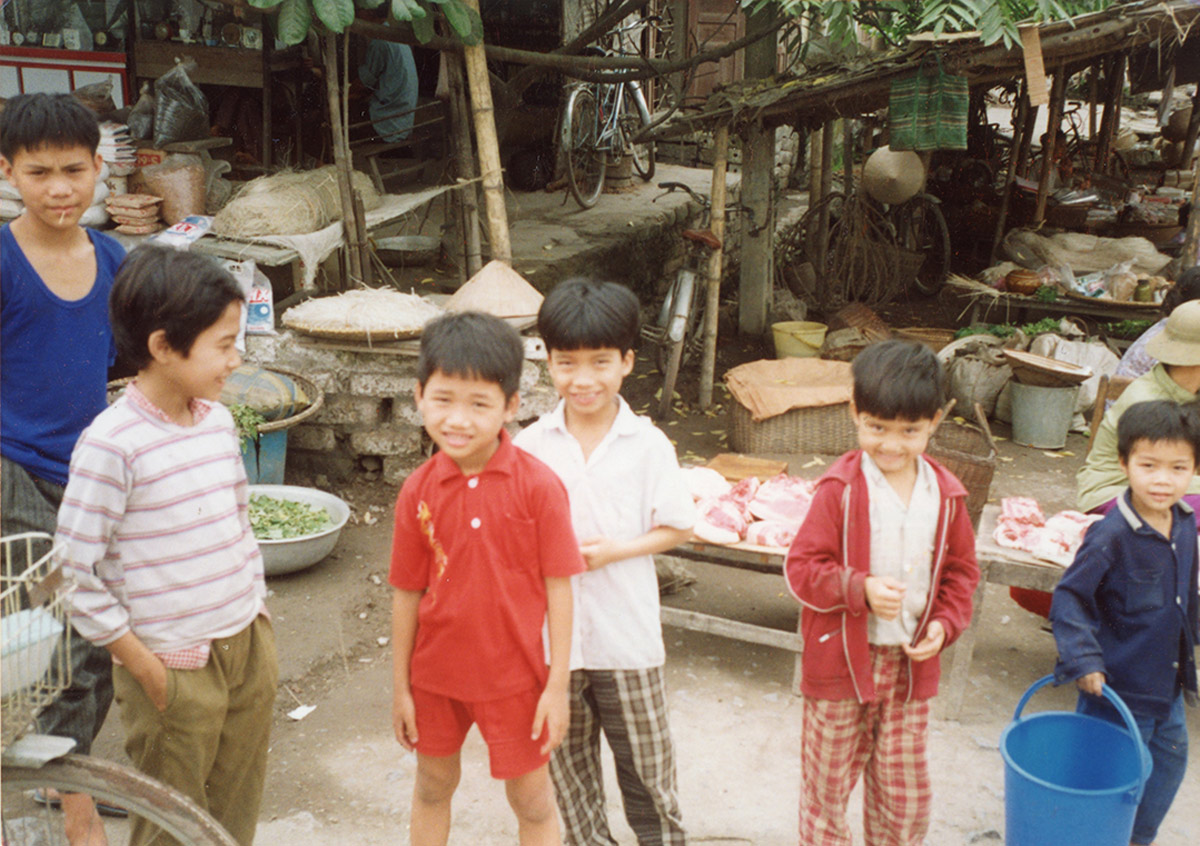
Kids smiling at this Tay (foreigner), Nam Dinh Province (Photo by Marc Yablonka)
That noise was often the result of a band of Australians who were in Hanoi tasked with repairing the antiquated telephone lines, which had been so badly obliterated by American bombs during the war.
Their straw boss, Ray, and the guys were a jovial bunch. They were also the most hard-drinking band of brothers I have ever met before or since! It was not uncommon for me to come home from the university to find them all in the lobby, plastered, 333 Beer cans piled high on the coffee table, cigarette butts likewise in the ashtray. Their brand of English was very hard for my American ears to discern whether they were drunk or sober.
“Eh Marc. Have a fair dinkum, mate?” “Huh?” I asked, the first time I heard the expression. “A fair dinkum, mate?” “What?” I said. “A good day, mate! Did ya have a good day?” “Ohhhhh! Yeah, I did. How about you?”
One night the Aussies invited me to come along with them to a dance hall called the Palais. French for palace. Being bored, I obliged. I laughed when I saw all the guys making sure they had their condoms along for the ride in their wallets.
Scoring in a foreign land, especially in the Third World, has never been my intention, so I went along condomless. I did slip a few VND (Vietnamese Dong currency) into the hands of a dance hall gal for one dance, but that was the extent of my extracurricular activities with a member of the opposite sex that night.
But here is where the night got weird. First a precursor:
Two years before I first ventured to Vietnam in 1990, I attended a lecture on Vietnam, Laos, and Cambodia given by a Canadian travel agency at the Pacific Asian Museum in Pasadena. The keynote speaker was a Dr. Barbara Cohen, a psychiatrist from Burlingame, California who had sold her practice to become a fulltime tour guide for the travel agency. Dr. Cohen had been a US Army shrink at the 95th Evac Hospital in Da Nang during the war.
So, we’re all sitting around a table at the Palais, and after a couple of warm bottles of 333, the straw boss Ray says, “I’ll be right back. I’m gonna go pick up my girlfriend Susie.”
Ray returns with Susie, an attractive Caucasian brunette, a short while later. Susie sits down and starts talking about Vietnam Airlines. “Isn’t it great,” she exclaims. “Vietnam Airlines flies directly into Phu Bai now!” Then she tells those of us at the table that during the Vietnam War, she served as an Army psychiatrist at the 95th Evac Hospital in Da Nang.
It had been four years, but I recalled the afternoon at the Pacific Asian Museum. “Did you know Doctor Barbara Cohen?” I asked Susie. She deadpans me and says, “I am Doctor Barbara Cohen.” Total silence. I look at Ray. He’s white as a ghost. I made my exit before whatever could have hit the fan did! Luckily, I did not run into Ray again.
I came by the knowledge years later that Dr. Cohen wrote a travel book about Vietnam some years before called The Vietnam Guidebook. I’ve never read it, but it’s supposed to be very good.
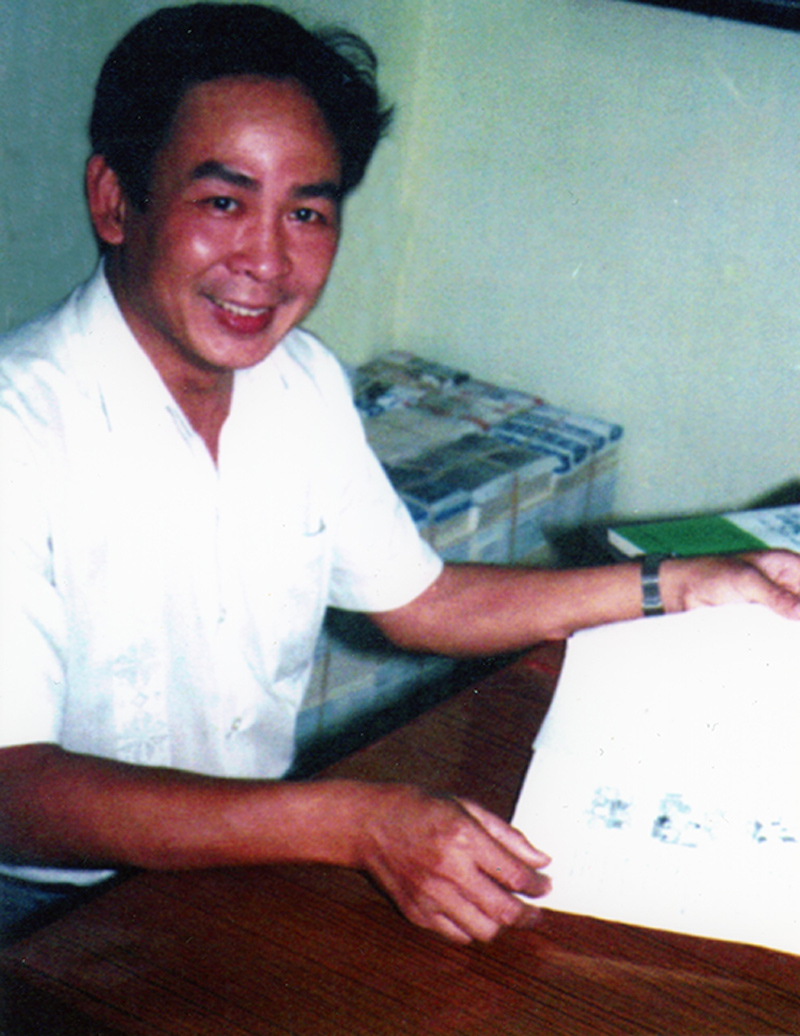
Professor Nguyen Ngoc Hung, Vice-Director, English Departmnent, Hanoi Foreign Language College (Photo by Marc Yablonka)
I met other notables in Hanoi. One of whom was Professor Nguyen Ngoc Hung, then the Vice-Director of the English department of the Hanoi Foreign Language College. Hung has since moved up the education ladder among academics in Hanoi.
Over the obligatory tea, Hung, who had been an NVA colonel attached to Quang Tri Province south of the DMZ, lamented the fact that his efforts to establish a Vietnam Memorial for his fellow soldiers who had perished during the war had fallen on deaf ears among the powerful in his hometown.
He also reminisced about North Vietnam’s victory.
“Even when Russia and China had sold us out,” he told me. “We heard voices. Voices from America.”
Hung then led me down the halls of another institution that functioned in an air of destruction. Again, no glass in the windows. The paint crawled up the walls. He took me to an English class, perhaps unannounced. I say so because the beautiful Vietnamese professor, wearing her áo dài, shook at the sight of me.
Hung introduced us and left the room. The professor went about her lesson shaking nervously, writing on a blackboard unquestionably dating back to the French era. My heart sank when I saw that she was forced to erase her lessons with a rumpled piece of Kleenex. Not one eraser in sight.
Hung was invited to speak in the US some years after the war as a guest of the Vietnam Veterans Against the War and other activist groups who had passed the hat round to pay for his plane fare. It was at one meeting that he befriended Vietnam veteran Ron Kovic, author of the book Born on the Fourth of July, later an Oliver Stone film.
“We met at a vets’ center near a beach in California. He came in. We were both tense at first. We began to measure each other up. I thought to myself, ‘Here is a man that could be my friend.’ Then we shook hands and became friends quickly.” I included that part of our conversation for a profile I wrote about Hung for Pacific Stars and Stripes upon return home.
I was not the only journalist to profile Hung, however. He was mentioned in CBS-TV’s 60 Minutes news magazine anchor Morley Safer’s book Flashbacks, about his return to Vietnam for the first time since covering the war for CBS News. Fellow CBS News anchor Charles Kuralt also interviewed Hung for his weekend show Sunday Morning.
A fellow resident of the Army Guest House when I was there was Program Director for NHK affiliate Radio Japan, Masako Yuasa. I was fortunate to be able to interview Masako for a piece that ran in the English language daily Japan Times.
The then 27-year-old bespectacled announcer was very much aware that relations between Japan and Vietnam depended on the American embargo still in place in 1992. An embargo that she very much opposed.
“I know everything has a reason,” she told me over dinner at a Chinese restaurant in Hanoi. “But America has to make concessions. Please don’t hurt the Vietnamese people.”
There were others, like a well-known about town fellow (name long ago forgotten) from the American mission in Hanoi that would soon blossom into the first US Embassy in Vietnam since our total withdrawal from South Vietnam in April 1975.
Being the only other white face in a restaurant in Hanoi’s old city one night, he asked if he could join me. I was glad for the company. He told me that he had learned to speak Vietnamese fluently at the Defense Language Institute in Monterey. I asked him if, being in his position, he’d been followed to the restaurant. “Probably,” he said, not bothering to look around the room.
I remember, too, a trip the professors took me on to Nam Dinh Province, about 90 kms. outside of Hanoi. Sitting on the side of a mountain with my colleagues, I looked out at the limestone mountain across the valley and thought of Graham Greene’s vivid description of those very same mountains in The Quiet American
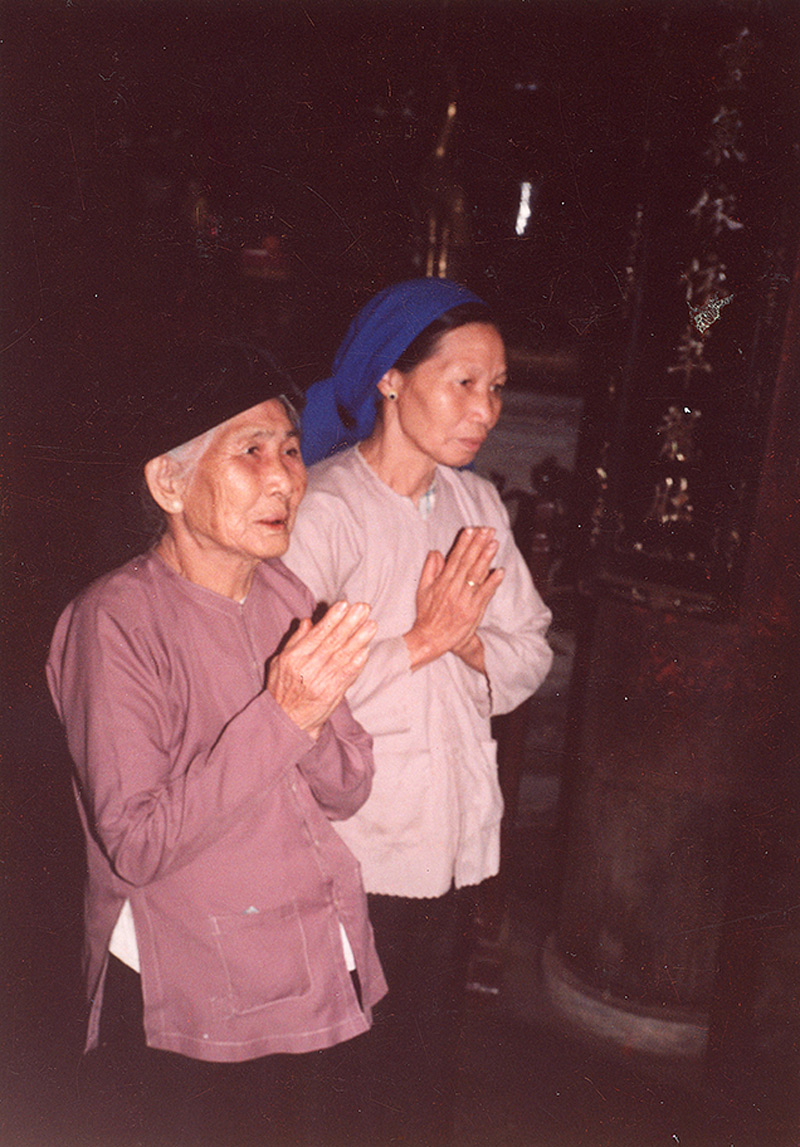
Women praying in a Buddhist temple in Hanoi. (Photo by Marc Yablonka)
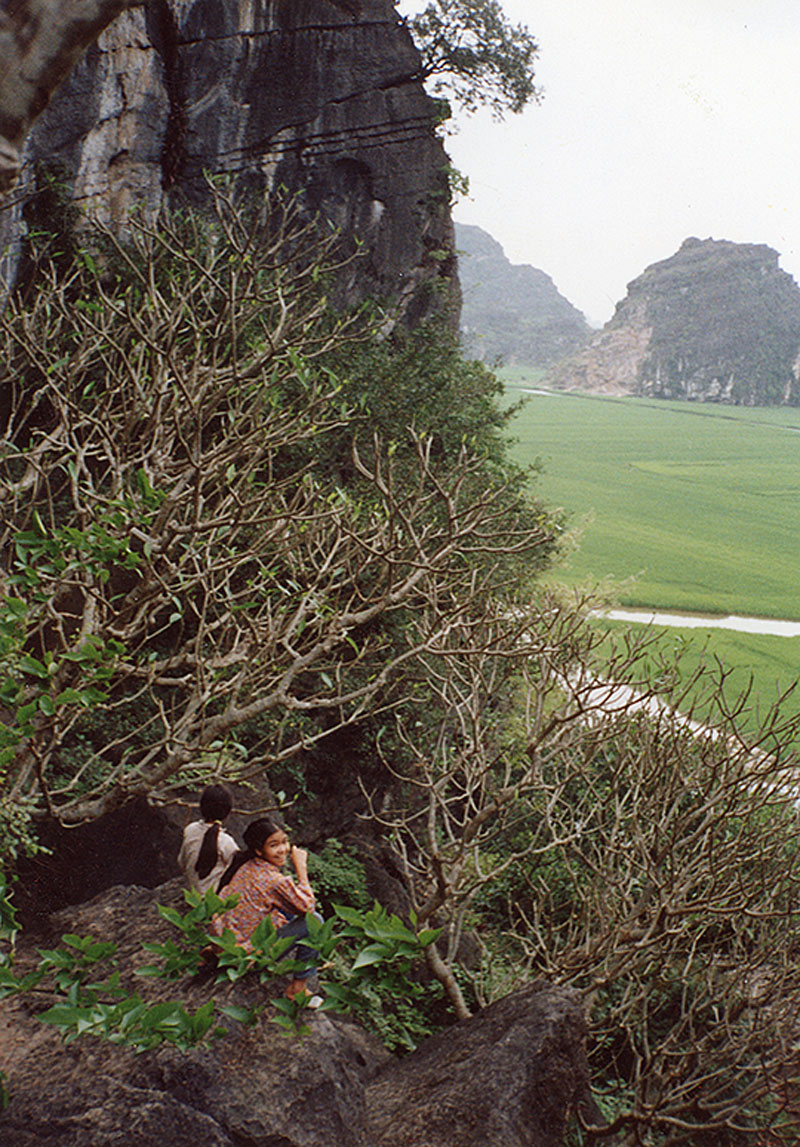
Limestone mountains of Nam Dinh Prefecture (Photo by Marc Yablonka)
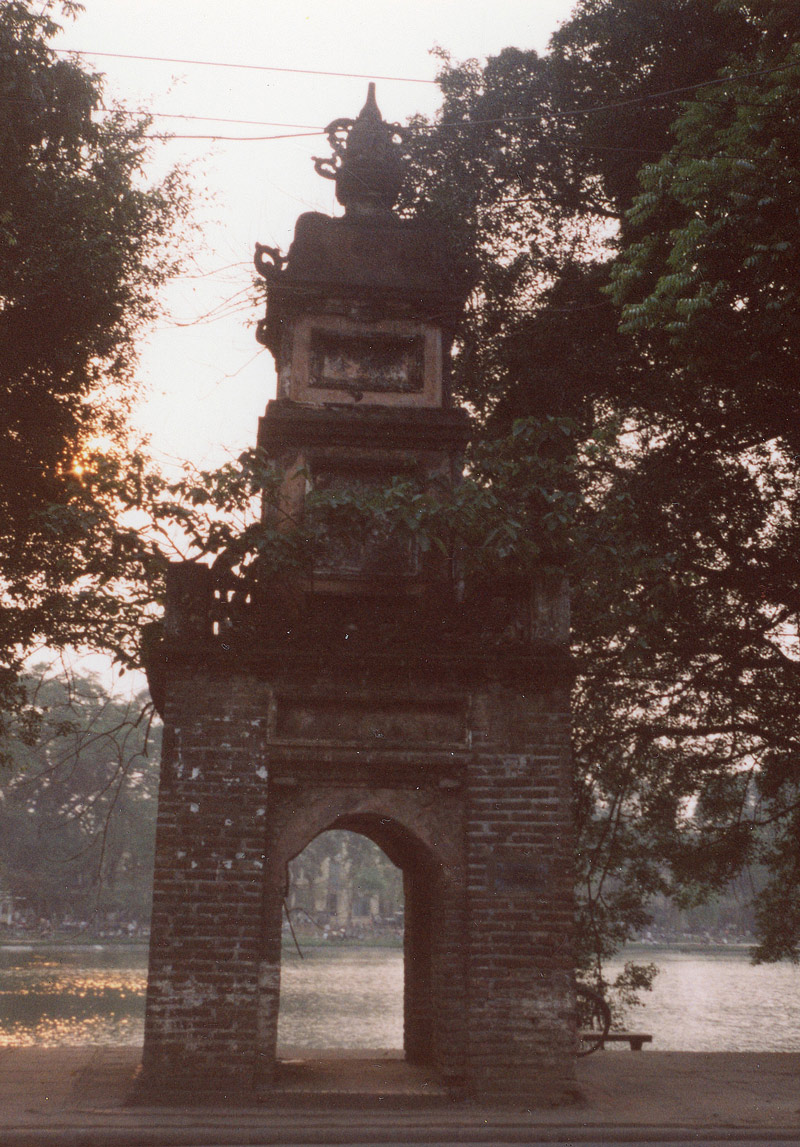
Hoan Kiem Lake, Hanoi (Photo by Marc Yablonka)
When safely home from Hanoi, I had a real “Been there and done that” moment as I sat in the theater watching the film Indochine, starring French actress Catherine Deneuve. Right before my eyes were what my professor friends described as the “Inland Ha Long Bay,” underwater caves, and the Buddhist temple atop a mountain, which, thanks to them, I had seen in person a couple days before departing Gia Lam Airport.
As a parting gift, my professor friends gave me a wooden Buddha that still sits atop a curio cabinet in my home all these years later. I chuckle when I remember the Vietnamese customs agents examining it for hidden drugs, and I pray that all of them are healthy, safe, and happy as Tết, the Vietnamese New Year, arrives tomorrow.
ABOUT THE AUTHOR — Marc Yablonka is a military journalist and author. His reportage has appeared in the U.S. Military’s Stars and Stripes, Army Times, Air Force Times, American Veteran, Vietnam magazine, Airways, Military Heritage, Soldier of Fortune and many other publications. He is the author of Distant War: Recollections of Vietnam, Laos and Cambodia, Tears Across the Mekong, and Vietnam Bao Chi: Warriors of Word and Film.
Between 2001 and 2008, Marc served as a Public Affairs Officer, CWO-2, with the 40th Infantry Division Support Brigade and Installation Support Group, California State Military Reserve, Joint Forces Training Base, Los Alamitos, California. During that time, he wrote articles and took photographs in support of Soldiers who were mobilizing for and demobilizing from Operation Iraqi Freedom and Operation Enduring Freedom.
His work was published in Soldiers, official magazine of the United States Army, Grizzly, magazine of the California National Guard, the Blade, magazine of the 63rd Regional Readiness Command-U.S. Army Reserves, Hawaii Army Weekly, and Army Magazine, magazine of the Association of the U.S. Army.
Marc’s decorations include the California National Guard Medal of Merit, California National Guard Service Ribbon, and California National Guard Commendation Medal w/Oak Leaf. He also served two tours of duty with the Sar El Unit of the Israeli Defense Forces and holds the Master’s of Professional Writing degree earned from the University of Southern California.
Leave A Comment